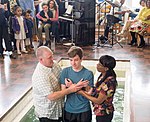The Christian Unity Baptist Association was organized September 27-September 28, 1935 at Zion Hill Church in Ashe County, North Carolina, by six Baptist congregations. Some of these churches were remnants of the Macedonia Baptist Association, which existed for a short time in the first quarter of the 20th century. These churches had a mixed Missionary Baptist and Primitive Baptist background. Leaders in this new organization included Frank Sturgill, F. Carl Sturgill, and Nancy Owens.
Though the Christian Unity Association shared much in common with fellow mountain Baptists, they differed from the majority of them in three important points: (1) falling from grace; (2) open communion; and (3) women preachers. Two women preached at the organizational meeting.
The Christian Unity Baptist Association is defunct. This body divided in 1969, and the majority chose to affiliate with the General Association of Separate Baptists. The minority represented continuity with the original constitution and articles of faith. The two surviving churches from that fellowship (Zion Hill & Hooks Branch in Va.), with a combined membership of about 50, no longer hold an associational structure.
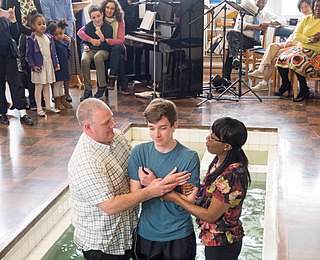
Baptists form a major branch of Protestantism distinguished by baptizing professing Christian believers only, and doing so by complete immersion. Baptist churches also generally subscribe to the doctrines of soul competency, sola fide, sola scriptura and congregationalist church government. Baptists generally recognize two ordinances: baptism and communion.

The Christian Church is a mainline Protestant Christian denomination in the United States and Canada. The denomination started with the Restoration Movement during the Second Great Awakening, first existing during the 19th century as a loose association of churches working towards Christian unity, then slowly forming quasi-denominational structures through missionary societies, regional associations, and an international convention. In 1968, the Disciples of Christ officially adopted a denominational structure at which time a group of churches left to remain nondenominational.

The Second Great Awakening was a Protestant religious revival during the early 19th century in the United States. The Second Great Awakening, which spread religion through revivals and emotional preaching, sparked a number of reform movements. Revivals were a key part of the movement and attracted hundreds of converts to new Protestant denominations. The Methodist Church used circuit riders to reach people in frontier locations. The Second Great Awakening led to a period of antebellum social reform and an emphasis on salvation by institutions. The outpouring of religious fervor and revival began in Kentucky and Tennessee in the 1790s and early 1800s among the Presbyterians, Methodists and Baptists.

The Southern Baptist Convention (SBC) is a Christian denomination based in the United States. It is the world's largest Baptist denomination, and the largest Protestant and second-largest Christian denomination in the United States. The word Southern in "Southern Baptist Convention" stems from its having been organized in 1845 in Augusta, Georgia, by white supremacist Baptists in the Southern United States who were supportive of enslaving Americans of African descent and split from the northern Baptists.

The Restoration Movement is a Christian movement that began on the United States frontier during the Second Great Awakening (1790–1840) of the early 19th century. The pioneers of this movement were seeking to reform the church from within and sought "the unification of all Christians in a single body patterned after the church of the New Testament."

The Separate Baptists in Christ are a denomination of Separate Baptists found mostly in United States.

Though the annual meeting of this group is denominated The General Association of The Baptists, they are most widely known as the Kindred Associations of Baptists. Other names associated with these churches are the Baptist Church of Christ, The Baptists, and Separate Baptists. The primary location of the churches is middle Tennessee and northern Alabama. Members from this association form the largest body of Baptists in Moore County, Tennessee.

The Progressive National Baptist Convention (PNBC), incorporated as the Progressive National Baptist Convention, Inc., is a mainline predominantly African-American Baptist denomination emphasizing civil rights and social justice. The headquarters of the Progressive National Baptist Convention are in Washington, D.C. Since its organization, the denomination has member churches outside the United States, particularly in the Caribbean and Europe. It is a member of the National Council of Churches and the Baptist World Alliance.
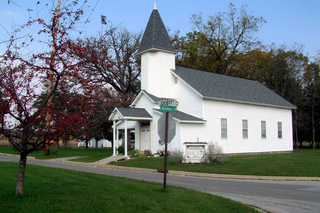
United Baptist is name of several diverse Baptist groups of Christianity in the United States and Canada.

The Apostolic Christian Church (ACC) is a worldwide Christian denomination from the Anabaptist tradition that practices credobaptism, closed communion, greeting other believers with a holy kiss, a capella worship in some branches, and the headcovering of women during services. The Apostolic Christian Church only ordains men, who are authorized to administer baptism, the Lord's Supper, and the laying on of hands.

The African Methodist Episcopal Zion Church, or the AME Zion Church (AMEZ) is a historically African-American Christian denomination based in the United States. It was officially formed in 1821 in New York City, but operated for a number of years before then. The African Methodist Episcopal Zion Church adheres to Wesleyan-Arminian theology.
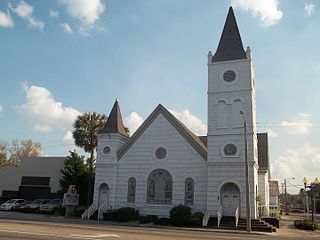
The black church is the faith and body of Christian congregations and denominations in the United States that minister predominantly to African Americans, as well as their collective traditions and members. The term "black church" can also refer to individual congregations.

Baptists in the United States make up a large number of all Baptists worldwide. Approximately 15.3% of Americans identify as Baptist, making Baptists the second largest religious group in the United States. Baptists adhere to a congregationalist structure, so local church congregations are generally self-regulating and autonomous, meaning that their broadly Christian religious beliefs can and do vary. Baptists make up a significant portion of evangelicals in the United States and approximately one third of all Protestants in the United States. Divisions among Baptists have resulted in numerous Baptist bodies, some with long histories and others more recently organized. There are also many Baptists operating independently or practicing their faith in entirely independent congregations.

Religion of black Americans refers to the religious and spiritual practices of African Americans. Historians generally agree that the religious life of black Americans "forms the foundation of their community life". Before 1775 there was scattered evidence of organized religion among black people in the Thirteen Colonies. The Methodist and Baptist churches became much more active in the 1780s. Their growth was quite rapid for the next 150 years, until their membership included the majority of black Americans.
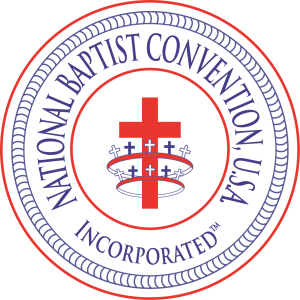
The National Baptist Convention, USA, Inc., more commonly known as the National Baptist Convention, is a primarily African American Evangelical Baptist Christian denomination in the United States. It is headquartered at the Baptist World Center in Nashville, Tennessee and affiliated with the Baptist World Alliance. It is also the largest predominantly Black Christian denomination in the United States and the second largest Baptist denomination in the world.

The Christian Council of Ghana (CCG) is an umbrella group that unites 31 churches and denominations in Ghana. The council has its members from Charismatic, Pentecostal, Orthodox and other churches.

The history of Methodism in the United States dates back to the mid-18th century with the ministries of early Methodist preachers such as Laurence Coughlan and Robert Strawbridge. Following the American Revolution most of the Anglican clergy who had been in America came back to England. John Wesley, the founder of Methodism, sent Thomas Coke to America where he and Francis Asbury founded the Methodist Episcopal Church, which was to later establish itself as the largest denomination in America during the 19th century.
North East India Christian Council (NEICC) is a Protestant ecumenical council of North East India, affiliated to the National Council of Churches in India as one of the regional councils in the year 1939.

Boro Baptist Convention or BBC is a Baptist churches convention based in Assam, India, with more than 52,000 members and 354 congregations as of 2014. The Boro Baptist Convention was established in 1914 and completed its centenary celebrations in 2014. It has its headquarters at Harisinga in Udalguri District of Bodoland, Assam. It is affiliated to the North Bank Baptist Christian Association. The Union is made primarily of Bodo people, an indigenous ethnic group of Assam.
